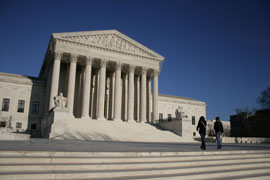Cronkite News has moved to a new home at cronkitenews.azpbs.org. Use this site to search archives from 2011 to May 2015. You can search the new site for current stories.
Opponents of voter registration law take case to Supreme Court
WASHINGTON – Opponents of Arizona’s voter identification law asked the U.S. Supreme Court Monday to let a lower court decision take effect that would end the state’s requirement of proof of citizenship for voter registration.
Justice Anthony Kennedy last week ordered a temporary stay of that ruling in response to state officials who said the decision, coming “on the eve of a new election cycle,” would have thwarted Arizona’s ability to “ensure fair federal elections.”
Kennedy gave opponents of the law until Monday to file a response to the stay. Arizona Attorney General Tom Horne has until Wednesday to reply.
Arizona has been requiring proof of citizenship since 2005, after the passage of Proposition 200. That law requires county recorders to reject any voter registration form without proof of citizenship and it requires people to present identification when they show up to vote.
A divided 9th U.S. Circuit Court of Appeals in April upheld the voter identification part of the law, but rejected the proof of citizenship requirement. The appeals court said a federal registration form — which does not require proof of citizenship, but asks applicants to confirm that they are citizens — pre-empts the state law.
Jon Greenbaum, one of the attorneys who helped file Monday’s brief, agreed with the appellate decision. He said the National Voter Registration Act “has a provision which says states have to accept and use the federal form” for voter registration.
The Constitution gives the federal government fairly broad powers to set election law and the states have to abide by it, said Greenbaum, the legal director for the Lawyers’ Committee for Civil Rights Under Law.
But Horne, in asking Kennedy for a stay last week, noted the federal registration act “also allows applicants to register by mail for federal elections using a state form.” He added that the Department of Justice, under the Voting Rights Act, had approved the state’s voting plan with its language specifically requiring proof of citizenship.
Since Proposition 200, Horne’s filing said, Arizona has accepted both the federal and state voter registration forms, but required evidence of citizenship with either.
The 9th Circuit ruling would have taken effect on Saturday had Kennedy not stepped in.
Advocates for Proposition 200 say letting people register without providing verification of citizenship allows undocumented immigrants to vote and ultimately harms the integrity of the voting system.
But opponents say such voter identification laws are politically motivated, aiming to frustrate voters who typically vote Democratic.
“There really isn’t any evidence that all these voter suppression measures are needed to combat voter fraud,” said Laughlin McDonald, director of the American Civil Liberties Union’s Voting Rights Project.
McDonald said the crux of the case is simply that Arizona’s form is inconsistent with the federal one. For Arizona to require anything more than what the federal form requires is “inconsistent with the federal law,” he said.
Greenbaum argued that, far from preventing fraud, Proposition 200 has had the effect of denying people the right to register. He pointed to state data about the number of people whose registration forms were rejected between 2005 and 2007, and the number who were able to go back later and register.
“About 31,000 people had their forms rejected because they did not provide proof of citizenship. And only about a third of them when back and registered to vote,” he said.
Greenbaum said the state has a heavy burden to prove in making its case for the stay to remain in effect.
But Horne, in his filing last week, said “there was no evidence of disenfranchisement on the basis of Proposition 200.” He said only one person, who is not a party to the suit, had been identified as having been denied registration because of citizenship issues.
On the other hand, he said, allowing the appeals court to void the citizenship requirement would cause “irreparable harm” to the state’s ability to conduct sound elections.







